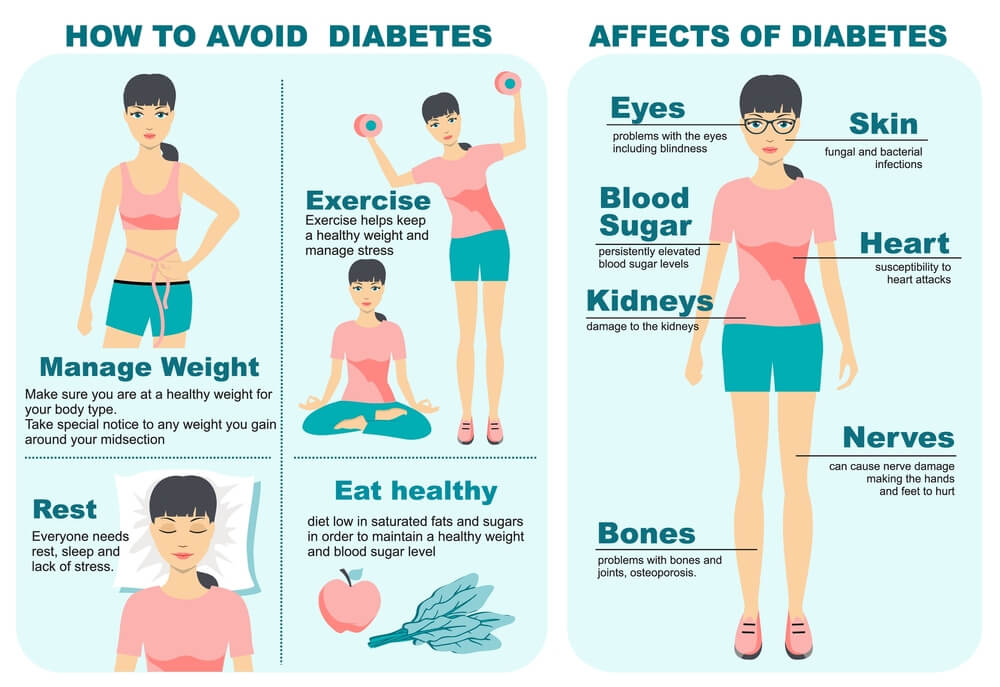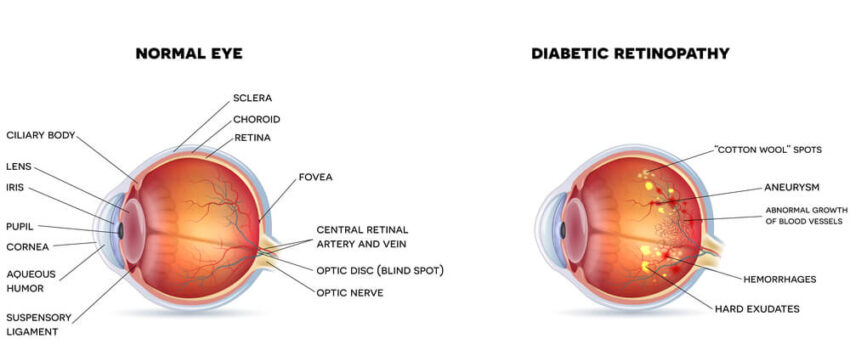A person with Diabetes is more at risk of eyes damage and Vision loss. Both type 1 and 2 diabetes can damage your eyes and cause vision loss without even showing prior symptoms. Diabetes is one of the primary causes of blindness in adults ages 20-74. Diabetes can damage your eyes for years without occurring any symptoms. If you and any of your family members have a history of Diabetes than consulting with an ophthalmologist should be an essential part of your healthcare.
Diabetic retinopathy is not only a disease that can affect Diabetic patients, they are also at higher risk to develop cataracts earlier and glaucoma. As per reports, 50% of individuals with diabetes may develop diabetic retinopathy at some point, but early detection and treatment can reduce the risk of blindness by 95%. Everyone with diabetes is at risk for this eye disease.
Diabetic Eye Diseases
- Diabetic Retinopathy: Diabetic retinopathy occurs when there is damage to the tissue of the blood vessels in the back of the eye. Early symptoms include floaters, blurriness, dark areas of vision and difficulty perceiving colours. Blindness can occur.
- Diabetic Macular Edema: Due to high blood sugar swelling can occur in the macula, which is the part of the retina responsible for your central vision.
- Glaucoma: Glaucoma is caused by increased pressure in the eye. Due to Glaucoma, there are high chances of damage to the optic nerve. It can cause peripheral vision loss before noticeable symptoms occur.
- Cataracts: When the lens inside your eye becomes cloudy it is called cataract, symptoms are blurry, cloudy or decreased vision.

Symptoms of Diabetic Eye Problems
Diabetes can affect your vision in many ways. It may damage your vision without occurring any symptoms. But if you experiencing any of the ones listed below don’t delay to consult an Ophthalmologist. For a diabetic person, a regular eye examination is required for early detection and treatment to reduce the risk of blindness.
- Blurry vision
- Black spots
- More floaters than usual
- Feeling like a curtain is pulled over your visual field
- Flashes of light
- Any loss of sight in one or both eyes
5 Ways to Avoid Diabetic Eye Disease
Attending Annual Comprehensive Diabetic Eye Exams
An annual diabetic eye exam is similar to a standard comprehensive eye exam that may last up to 30 mins. At Visitech Eye Centre we will dilate your eyes and focus on the health of your retina and the blood vessels in each eye. An eye specialist must conduct this exam, after examination they can advise you to increase or decrease your exam frequency depending on how well your blood sugar is being controlled.
Controlling Blood Sugar
High blood sugar is the primary reason for the damage to blood vessels in the back of your eyes. The damage can begin as early as pre-diabetes. It is advisable to keep your blood sugar under control to lower the risk of diabetic eye problems.
Controlling Blood Pressure
High blood pressure affects diabetic patients badly, it increases the risk of retinopathy along with stroke and heart attack. Consult your physician to control your blood pressure and reduce the risk of diabetic eye diseases.
Controlling Cholesterol
Diabetes can impact cholesterol levels, It increases bad cholesterol and decreases good cholesterol. So the risk of diabetic retinopathy also increases. It’s necessary to manage cholesterol levels for overall health and eye health.
Don’t Smoke
Smoking is one of the factors that increase the risk of developing type 2 diabetes. If someone takes insulin, smoking can reduce its effectiveness. The patient may require more to manage blood sugar and increase the risk of diabetic eye conditions.
If you facing such symptoms you can Visit to Visitech Eye Centre or Consult us Online.
